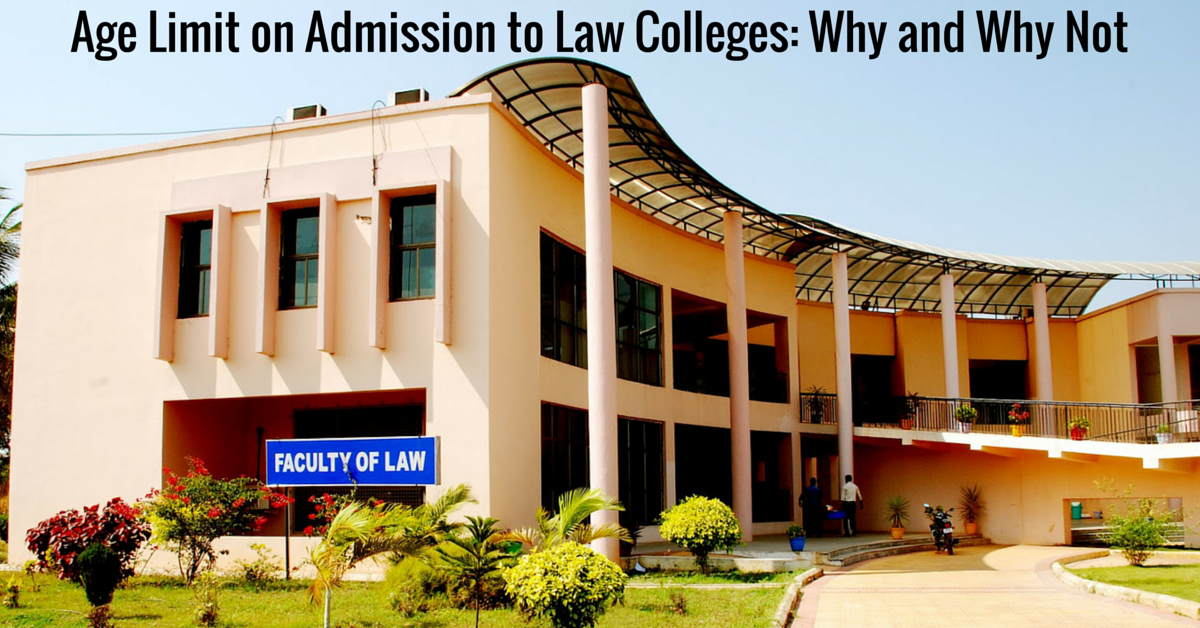This article has been republished from A First Taste of Law. The most popular posts from the old blog that is now closed are being reshared here.
Recently the Bar Council of India has decided that no one will be allowed to join a 5 year LL.B course after they cross the age of 20, and a 3 year LL.B. course once they are of 30 years. In India, people often study law and join the profession late in their life. Many others practice or engage in some sort of lawyerly activity as a second profession. Naturally a person in my position would wonder about the rationale behind this age restriction on legal education. Why? And why now? What about those who get introduced to the fascinating possibilities that legal profession offers late in life and want to pursue the same?
Interestingly, the Bar Council earlier tried to impose an age restriction on joining the bar, in which they failed miserably. The Supreme Court ruled that it had no right to prevent any person of any age from joining the profession to practice in a court, or otherwise. Naturally, one wonders if they have found a roundabout way to do the same thing by imposing an age restriction on legal education itself. If you can not study law, you can’t practice, can you? I hope that the Bar Council of India, which is responsible for regulating legal education in India, is not acting in the narrow interests of practicing lawyers who would like to limit competition by preventing entry into the profession. On the face of it, the BCI is saying that they are trying to prevent the mushrooming of sub-standard law colleges with this move, but pardon me for any lack on my part, I fail to see any reasonable connection between the stated intention and the action. Is the BCI saying the mushrooming sub-standard colleges used to admit only those who are over the age limit they are proposing? Or is it that if people over 20 do not study law the allegedly mushrooming colleges will have no interest in running colleges? Did they rely on any study or survey to come to this decision? Even if this seemingly unbelievable hypothesis is correct, I don’t see why the BCI should make students above the age of 20 pay for their inability to set and implement a good standard for emerging law colleges.
Why should one be concerned?
Firstly, a law is not an insulated subject. A microchip engineer can do with knowing only his own subject; a lawyer, irrespective of whether he is working in a law firm or practicing at the bar, can not restrict his expertise to the knowledge of law alone. His clients will inevitably bring matters that involve subjects that he did not learn in law school, and so it helps to have a background in different commerce or science subjects depending on the chosen area of expertise. A person who has studied computer engineering or networking, and later goes on to become a lawyer, would have an indisputable advantage as far as the cyber law is concerned. A person who has studied biotechnology in a degree course will find that he has a natural advantage over others when he starts practicing in the area of the pharmaceutical intellectual property. It is not only studying, those who have a background in specialised industries, make it big when they join the practice of law. If I was a lawyer without any specialisation, it is foreseeable that I may find such specialisation threatening to my position in the market. Nevertheless, it is also true that the legal industry in India desperately requires specialists. If you run an automobile company, and want to appoint an arbitrator to settle a patent sharing dispute over some sort of engine, who would you trust, a lawyer or a retired judge without any direct knowledge of or exposure to the automobile industry, or a former automobile engineer who has a sound knowledge of patent law? Or think, if you have an anti-dumping dispute at the WTO, should it be only the lawyers without technical knowledge about that particular industry to prepare the case and argue before the dispute settlement body, or would you like to have a specialist with experience in that industry to be on board (remember that in developed countries there is no restriction on studying law based on age, and specialisation is highly valued)? It seems to me this move by BCI will very effectively keep away these experts from studying law.
Take the example of Anil Seth, a partner in a law firm in Delhi. He is a graduate from IIT who joined the IAS first, then while arguing in tribunals for the government realised that he could have an excellent career in law. He obtained a degree in law and left IAS to practice law in the Supreme Court on his own. Two years later, he was inducted in a promising firm as a partner. Lawyers like Anil Seth are valuable to the industry, but the BCI seems to be hell bent on preventing people like him from practicing. First, they imposed an age restriction on enrollment of lawyers, and when they failed, they are now attempting to deprive people like Seth from learning law altogether.
Secondly, legal education is not just a way of earning one’s livelihood. It’s much more than that. Learning the law of one’s own country is a matter of right. It is a tool to defend the rights of the people as well as one’s own. Here I would like to mention Colin Gonsalves, the luminary behind Human Rights Law Network and a senior counsel at the Supreme Court. He was working as an engineer when he decided that he could better contribute to society by protecting those who can not afford lawyers from a violation of human rights as a human rights lawyer. If someone wants to follow his example today, they will find their way blocked by the BCI. Are they telling us we cannot learn the law of the land anymore if I did not join a law college by the age of thirty? Don’t you think we should be concerned?
Law Schools
Age restrictions in law schools are not new. It was already in place when BCI came up with their rules. However, the effect of that was not to prevent the legal education of the aged altogether as other conventional law colleges took in more aged persons. Nevertheless, I would say that this is a good time to question the age limit of twenty years in the new age law schools as well. Why do we have it? Nobody seems to know this, or if they know, they don’t explain it publicly. I approached one of our popular professors in NUJS, Prof. Prabhash Ranjan, who has been to several Universities and law schools abroad and in India. In his opinion, there is no rationale behind this age restriction apart from the apprehension that aged students may not gel well with the young ones. I agree that autonomous institutions should have the right to focus on students of a certain age group, and especially when there is substantial competition to get into these institutions, application of age limit may be justified on the ground that young students would not be in a position to effectively compete with older students. However, in law schools of repute abroad, age is not a bar to admission, and very much like we do at least in management institutes in India, experience in any professional field is given preference. There is no doubt that students with varied backgrounds and practical experiences enrich the institution. It should be left to the institution to find the right mix of aged and young students that results in a perfect balance.
Newspapers report that many had filed cases in different High Courts agaisnt this decision of the BCI. I believe that the judiciary will see this self-interested and narrow measure for what it is and scrap the same. There is little debate or protest on this, but I believe that the limits of allowable level of interference on autonomy of law schools on part of the BCI should be defined. Also, law schools need to come up with clear age restriction policies and reasons explaining any such policy if for no other reason then for the sake of transparency in decision making. All the students in their mid-twenty that you are refusing quality legal education on basis of their age, and who always have to go abroad to get the same, deserve an explanation.
 Serato DJ Crack 2025Serato DJ PRO Crack
Serato DJ Crack 2025Serato DJ PRO Crack









 Allow notifications
Allow notifications



This is a great post. I have read your article. It’s really nice! Thanks for sharing this article.
Great! Thanks for providing Latest updates and useful information
I am 40 year old lady.I want to study law.This is possible for me.plz reply
[email protected]
Could u say me if there is any entrance for law study
The fact of the matter is that why there should not be age bar in Law course only?? and why not in MBBS, BTECH etc. It is highly regrettable to note that a student who just after pursuing his 12th standard would be forced to compete in a entrance examination with a 45 year old man with 2-3 degrees already where in some universities such as Panjab University, Chandigarh give weightage in marks for having a grad degree from PU, if Hons addl weightage and Masters then again. In that case a class 12 won’t be getting such weigtages and inspite of securing more marks in an entrance examination would suffer in securing a seat because a 45 yr old man had more degree than him
I oppose such an idea. Let everybody gets equal chance. More over it is a proven fact that the efficiency and intelligence levels to grasp and learn are more in younger minds than the older ones. Nobody should be allowed to go back and start graduation course which are entrance based as it would allow a person to just collect degrees for names and would restrict the deserving younger minds with already post graduated uncles.